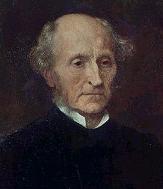M. Allen Cunningham's Blog, page 25
February 23, 2010
Prime Passage: Posthumous Keats by Stanley Plumly
February 3, 2010
Prime Passage: The Private Papers of Henry Ryecroft by George Gissing (1903)
"Is there, at this moment, any boy of twenty, fairly educated, but without means, without help, with nothing but the glow in his brain and steadfast courage in his heart, who sits in a London garret, and writes for dear life? There must be, I suppose; yet all I have read and heard of late years about young writers, shows them in a very different aspect. No garretteers, these novelists and journalists awaiting their promotion. They eat -- and entertai...
January 7, 2010
Why It's Desirable to Be Eccentric
Back in 1859 the great English thinker John Stuart Mill published, in Chapter Three of his treatise On Liberty, one of history's most cogent apologias on the subject "Of Individuality as One of the Elements of Well-Being."
To Mill's view, mass opinion (what we might call "mass culture" these days), is an undeniable blight to individuality, and therefore directly threatens freedoms civic and intellectual, cultural, and democratic.

While explicitly political, Mill's argument reaches down...
January 5, 2010
Prime Passage: The Stones of Venice by John Ruskin (1853)
"[...:] No good work whatever can be perfect, and the demand for perfection is always a sign of the misunderstanding of the ends of art. This is for two reasons, both based on everlasting laws. The first, that no great man ever stops working till he has reached his point of failure: that is to say, his mind is always far in advance of his powers of execution, and the latter will now and then give way in trying to follow it; besides that, he will always giv...
December 10, 2009
Prime Passage: How to Be Alone by Jonathan Franzen
"The will to record indelibly, to set down stories in permanent words, seems to me akin to the conviction that we are larger than our biologies. I wonder if our current cultural susceptibility to the charms of materialism -- our increasing willingness to see psychology as chemical, identity as genetic, and behavior as the product of bygone exigencies of human evolution -- isn't intimately related to the postmodern resurgence of the oral and the ecl...
September 15, 2009
In Defense of Solitude
In his 1848 work Principles of Political Economy, John Stuart Mill observed:
It is not good for a man to be kept perforce at all times in the presence of his s pecies. A world from which solitude is extirpated is a very poor ideal. Solitude, in the sense of being often alone, is essential to any depth of meditation or of character: and solitude in the presence of natural beauty and grandeur, is...
August 18, 2009
Prime Passage: Amusing Ourselves to Death: Public Discourse in the Age of Show Business by Neil Postman (1985)
A quarter-century after its publication, Postman's classic litany of questions remains salutary as we confront an age of Social Media and the e-book.
"What is information? Or more precisely, what are information? What are its various forms? What conceptions of intelligence, wisdom, and learning does each form insist upon? What conceptions does each form neglect or mock? What are the main psychic effects of each form? What is the relation between information and reason? What is the...
August 17, 2009
Prime Passage: George Washington's Farewell Address (1796)
Seems to me that Washington's words are well worth weighing amid the current party-line fracas concerning Health Care reform.
"There is an opinion that parties in free countries are useful checks upon the administration of the government and serve to keep alive the spirit of liberty. This within certain limits is probably true; and in governments of a monarchical cast, patriotism may look with indulgence, if not with favor, upon the spirit of party. But in those of the popular...
July 1, 2009
Prime Passage: The Ghost Road by Pat Barker
"I realize there's another group of words that still mean something. Little words that trip through sentences unregarded: us, them, we, they, here, there. These are the words of power, and long after we're gone, they'll lie about in the language, like the unexploded grenades in these fields, and any one of them'll take your hand off."
June 9, 2009
Prime Passage: Libra by Don DeLillo
"He walked through empty downtown Dallas, empty Sunday in the heat and light. He felt the loneliness he always hated to admit to, a vaster isolation than Russia, stranger dreams, a dead white glare burning down. He wanted to carry himself with a clear sense of role, make a move one time that was not disappointed. He walked in the shadows of insurance towers and bank buildings. He thought the only end to isolation was to reach the point where he was no longer sep...



